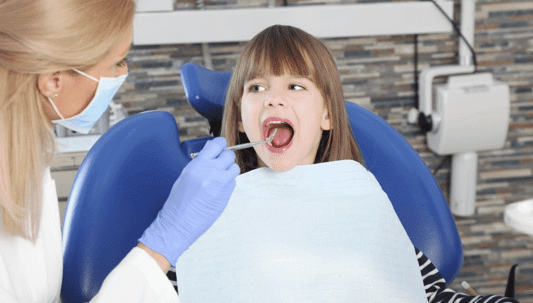Should cavities in baby teeth be filled? Many people believe they can be left alone, but it turns out baby teeth are very important for a long-term healthy smile. Cavities are caused by bacteria, which have been in the mouth and in an acidic environment for long periods of time. This problem usually occurs when a child does not brush or floss properly and eats too much sugar or too many carbohydrates. When sugar is left behind on the teeth, it attracts bacteria, resulting in plaque. Plaque is a sticky substance that eats away at the tooth, causing a cavity. The resulting infection can have lasting effects even after the baby's teeth have fallen out.
Baby teeth can actually stick around for a while. Most babies get their first tooth around 6 or 7 months of age; usually the bottom central incisors. Some children get their teeth a little slower, and it may be 12 months before the first one comes through. Additional baby teeth will continue to come in until almost three years of age. Children usually begin to get permanent teeth at 6 or 7 years of age. In fact, your child will not have all of his or her permanent teeth until approximately age 12 or 13.
There are many reasons why your child should visit the dentist for a check-up every six months, but some of the reasons include:
Baby teeth are the only teeth children have to chew with, and cavities can affect a child’s nutrition
- Baby teeth help children form words and speak
- Baby teeth create a path for permanent teeth to come incorrectly
- Damaged baby teeth can result in problems with jaw structure, growth, and occlusion
- Extensive cavities in baby teeth can lead to pain and infection, which affects a child’s overall health and ability to function on a daily basis
How do we avoid cavities? In order to reduce the risk of children getting cavities in their baby teeth, parents should:
- Limit juice and sugary beverages, as well as sugary foods
- Avoid letting your child sleep with a bottle or sippy cup with juice, milk, or sugary beverages
- Teach and assist your child with brushing for a full two minutes and floss if indicated by the dentist

